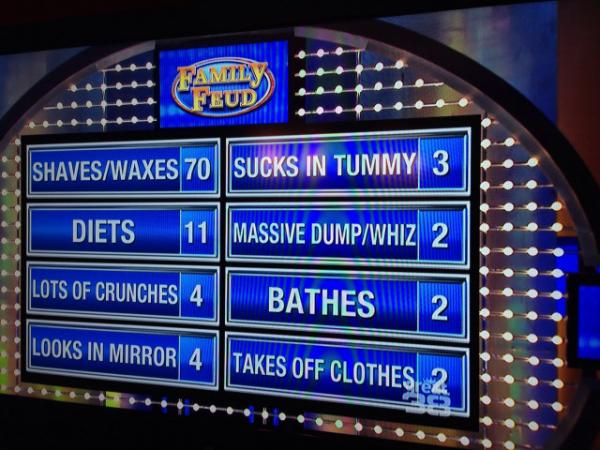2015-05-21
【Aiden in English】
Family Feud is a fun game show that our school’s gifted teacher, Mr. Hinz, hosts on the Olympic Day every year. The 6th graders get the privilege to play, while the lucky 4th and 5th grade classes have the opportunity as well. So now, I announce to you, welcome to Montgomery’s Olympic Day Half Time Show!
At the half time, the Mountaineers were in a solid 2nd place out of four teams. Yet after the first round of Family Feud, it didn’t see so anymore. People could say we were lucky, but for the most part, the Mountaineers demolished the Scouts. How the game works is the classes are selected from two teams each and they play, then another from the two same teams each. Family Feud is a game where a survey is asked from a certain amount of people about a question. Soon, a person in each family walks to a desk in the center to hear the question. Once the question is said, both people have to grab the bean bag in the center, and whoever grabs it first, answers the question. There are hundreds of answers, but only the ones the surveyed people said are correct. The goal, if you grabbed the bean bag, is to get the answer that the most people answered in the survey. If gotten right, your family can play and answer the other answers, but if not, the opposing team can steal and play. Once playing, the team has three strikes before the survey is turned over to the other team. The team can steal by just giving one correct answer. If neither family can finish the survey, the points (the total number of people that answered the same answer as your answers) go to the original team.
Opinion and judgment also plays an important role to the outcome of this game. For example, one survey was “What Would You Give to a Wanna-be Cowboy as a Gift?” Someone said a lasso, but a strike mark appeared. During the revealing stage, “rope” came up under the number five most picked answer. Unless it’s for torture, a rope is a lasso. Oh boy at the time, if that team knew the results, they would become the unhappy campers. (Get it? Theme?)
Now, the Olympics are supposed to measure the physicality of a person, not their brain. Apparently, Family Feud was worth a lot more to the Mountaineers than to any other team because we absolutely dominated, especially when we were the least favored to win. The half time show looked like a cure to an incurable disease. The Mountaineers collected the most points by far, giving our opponents basically no points.
This is the beauty of a school. If you’re not athletic, there’s always another route. Everyone must contribute, so that’s the only reason the Mountaineer are still in the game because there is Family Feud.
【紅霞譯文】
“領地實戰”是一個極其有趣的遊戲比賽,每年我校智優班老師杭茨先生都要在奧林匹克節上親自主持這個節目,初中一年級學生實力最佳,而小學四五年級的師弟學妹們也有幸同台較量,我宣布蒙哥馬利奧林匹克運動會中場休息表演現在開始!
中場休息時,登山者隊成績名列全校四個代表隊中的第二,可是經過頭一輪“領地實戰”交鋒之後,排名大有改觀。你可以說我們運氣好,不過大多數情況下,登山者隊依據實力勇克童子軍隊。比賽在兩個隊之間進行,每隊各選兩名隊員相互比試,然後再各派一對選手進行較量。“領地實戰” 根據公眾對某個問題的普遍看法而確定答案對錯,雙方推出一名代表到台中央搶答問題,發問後,誰先抓住沙包,誰才有權回答問題,其正確與否視普查結果而定,百分比越高的答案,得分的可能性越大。如果答對了,你的隊可以繼續回答下面的問題;如果答錯了,對方可以偷過來回答問題。比賽中,一個隊有三次這樣的機會,一旦三次都沒有答對,那麼該輪到對方回答。無論兩方哪一方答錯,便給對手增加得分的可能;倘若雙方都沒有答對,原隊得分(看法迥異不分伯仲)。
觀點和評判在本場比賽中起到了重要作用,譬如:有這麼一個調查結果涉及到,“如果你要贈送給牛仔一件禮物,那麼它是什麼?”有人回答說套索,但被打上了叉號,直到謎底揭曉時方才恍然大悟,原來第五號“繩索”是大眾公認的正確答案。這不成心跟人過意不去,繩索就是套索。天呀,假如當時回答問題的那個隊得知這樣一個結果,肯定會變成一幫被氣瘋了的營員。(明白嗎?奧林匹克節的主題?)
當今奧運會應該只衡量個人的體能素質而非才智素質, “領地實戰” 顯然讓登山者隊占了便宜,而對其他隊卻無關宏旨,因為這是我們克敵制勝的法寶,尤其當初身處劣勢的情況下,中場比賽讓我們發揮出自己的優勢。登山者隊幾乎控制了賽場局勢,使對手喪失得分手段。
這就是校園文化的美德之所在,即使沒有運動天賦,你仍可另闢蹊徑發揮一技之長。登山者隊之所以取得傲人的成績,靠的是“領地實戰”。







